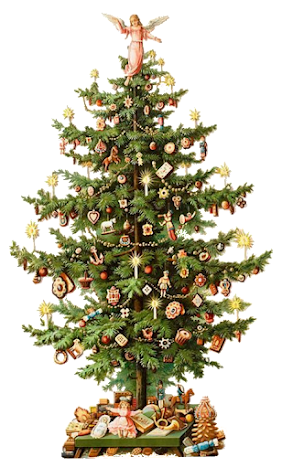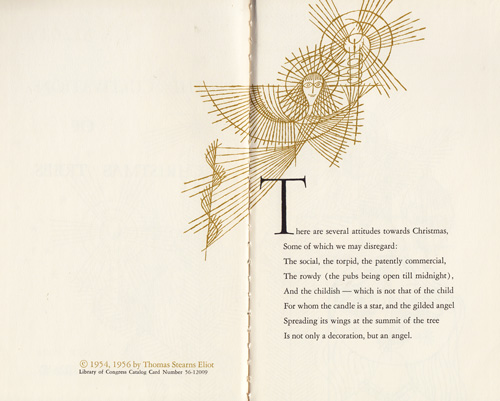Existen diversas actitudes en relación con la Navidad,
y de alguna de ellas podemos hacer caso omiso:
la social, la torpe, la manifiestamente comercial,
la bulliciosa (los bares están abiertos hasta la medianoche),
y la infantil, que no es la del niño
para el cual cada vela es una estrella, y el ángel dorado
desplegando sus alas en la copa del árbol
no es solamente un adorno, sino un ángel.
El niño se maravilla ante el árbol de Navidad:
dejadlo que continúe con ese espíritu de maravilla
ante la Fiesta, como un evento aceptado, no como un pretexto;
de modo que el luminoso enajenamiento, el asombro
del primer árbol de Navidad recordado,
de modo que las sorpresas, las alegrías de las nuevas posesiones
(cada una con su inconfundible y excitante perfume)
y la espera del ganso o del pavo,
y el expectante momento de su aparición,
de modo que la reverencia y el gozo
no sean olvidados en las experiencias posteriores,
en la fastidiosa rutina, la fatiga, el tedio,
el conocimiento de la muerte, la conciencia del fracaso,
o en la piedad del converso
que pudiera teñirle de vanagloria
desagradable a Dios e irrespetuosa hacia los niños
(y aquí el recuerdo también con gratitud
a Santa Lucía, su villancico, su corona de fuego):
de modo que antes del fin, en la octogésima Navidad
(significando por «octogésima» la última, cualquiera sea),
los acumulados recuerdos de la emoción anual
puedan concentrarse en una gran alegría
semejante siempre a un gran temor, como la ocasión
en que el temor llega a cada alma:
pues el principio nos ha de recordar el fin
y la primera venida la segunda venida.
Some of which we may disregard:
The social, the torpid, the patently commercial,
The rowdy (the pubs being open till midnight),
And the childish — which is not that of the child
For whom the candle is a star, and the gilded angel
Spreading its wings at the summit of the tree
Is not only a decoration, but an angel.
The child wonders at the Christmas Tree:
Let him continue in the spirit of wonder
At the Feast as an event not accepted as a pretext;
So that the glittering rapture, the amazement
Of the first-remembered Christmas Tree,
So that the surprises, delight in new possessions
(Each one with its peculiar and exciting smell),
The expectation of the goose or turkey
And the expected awe on its appearance,
So that the reverence and the gaiety
May not be forgotten in later experience,
In the bored habituation, the fatigue, the tedium,
The awareness of death, the consciousness of failure,
Or in the piety of the convert
Which may be tainted with a self-conceit
Displeasing to God and disrespectful to children
(And here I remember also with gratitude
St. Lucy, her carol, and her crown of fire):
So that before the end, the eightieth Christmas
(By “eightieth” meaning whichever is last)
The accumulated memories of annual emotion
May be concentrated into a great joy
Which shall be also a great fear, as on the occasion
When fear came upon every soul:
Because the beginning shall remind us of the end
And the first coming of the second coming.”








